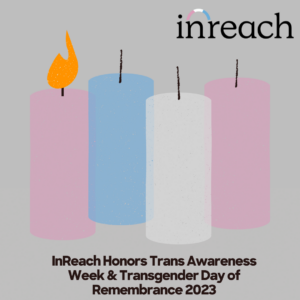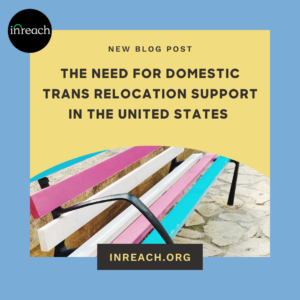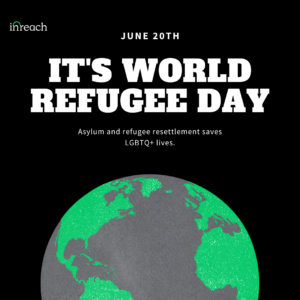No products in the cart.

Relevance of Culturally Competent Mental Health Care for LGBTQ+ People Seeking Asylum
[vc_row][vc_column][vc_custom_heading text=”Guest Blog Post by Jake Attias, 2020 InReach Summer Intern” font_container=”tag:h3|text_align:center|color:%23000000″][vc_separator][vc_custom_heading text=”What is culturally competent mental health care and why does it matter?” font_container=”tag:h4|text_align:center|color:%234892da” use_theme_fonts=”yes”][vc_column_text]
It is often a daunting experience for LGBTQ+ people to access affirming mental health care, and it becomes an even more difficult task for those in the queer community who are also seeking asylum. From navigating language barriers to cultural misunderstandings, it is no wonder that many LGBTQ+ asylum seekers have difficulty accessing effective and appropriate care. While there are numerous organizations and mental healthcare providers offering their services to LGBTQ+ asylum seekers, many of these services lack training and expertise in providing culturally competent services. This reality deters many LGBTQ+ asylum seekers from accessing the care that they desperately need to safely resettle in America.
So, what exactly is “culturally competent” healthcare? As defined by the US National Institute of Health, cultural competence in mental healthcare includes: “a set of skills or processes that enable mental health professionals to provide services that are culturally appropriate for the diverse populations that they serve.” In practice, this requires providers to undergo training and understand that people’s beliefs surrounding mental health are heavily impacted by their culture. It is imperative for providers to understand how cultural beliefs affect their patients’ behaviors, preferred methods of communication and treatment in order to best address their needs. This type of care involves service providers retaining a diverse staff that is representative of the communities in which they serve and practicing individualized care where patients help to determine their own preferred ways of communication and treatment.
[/vc_column_text][/vc_column][vc_column][/vc_column][/vc_row][vc_row][vc_column][vc_custom_heading text=”Relevance of culturally competent care for asylum seekers” font_container=”tag:h4|text_align:center|color:%234892da” use_theme_fonts=”yes”][vc_column_text]Asylum seekers in the United States experience tremendous hurdles and psychological stress. As reported by the American Psychiatric Association, about one out of three asylum seekers and refugees experience high rates of depression, anxiety, and post-traumatic stress disorders. This is hardly surprising, as refugees and asylum seekers face incredibly difficult obstacles that can result in lifelong mental health challenges from both their pre and post migration conditions and traumas encountered. Research from The Mental Health Foundation indicates that “asylum seekers are five times more likely to have mental health needs than the general population and more than 61% will experience serious mental distress, however, they are less likely to receive support than the general population”. Without securing proper mental healthcare, it is unlikely that a person will be able to effectively cope with stress leading to further difficulties.
Diagnosing an asylum seeker with a mental health issue is only the start of providing effective mental health care. Due to a person’s culture, religious beliefs, and potential stigmatization that they may encounter, it is crucial to provide individualized and culturally aware care plans to the extent possible. Due to prior negative patient-provider interactions or a lack of any prior interaction with a mental health care professional, many asylum seekers are hesitant to accept the care that is offered to them if providers make little to no effort to be conscious of different cultures and the resulting unique social norms that may conflict with those prevalent in the United States. When a healthcare system is built upon the foundations of trust and cultural competence, the chance of being able to reach more asylum seekers who are struggling with their mental health increases.[/vc_column_text][/vc_column][/vc_row][vc_row][vc_column][vc_custom_heading text=”Additional struggles faced by LGBTQ+ asylum seekers navigating mental health care” font_container=”tag:h4|text_align:center|color:%234892da” use_theme_fonts=”yes”][vc_column_text]As mentioned in the 2016 study Persecution Experiences and Mental Health of LGBT Asylum Seekers: “LGBT asylum seekers have unique early life experiences that are characterized by verbal, sexual, and physical abuse by parents and caregivers at home, peers and personnel at school, and in the larger community in their home countries.” The double stigmatization that LGBTQ+ asylum seekers face makes it even more difficult to approach mental healthcare providers as the fear of being “outed” as being a part of the LGBTQ+ community is an enormous risk, with often severe repercussions in their home country.
There is also evidence of higher rates of sexual trauma among LGBTQ+ asylum seekers which can lead to PTSD and additional mental health issues. LGBTQ+ asylum seekers are often isolated even further than non-LGBTQ+ asylum seekers due to stigma from their LGBTQ+ identity. Culturally competent healthcare providers can help to instill a sense of community and belonging for LGBTQ+ asylum seekers and ultimately, lessen the sense of total isolation.[/vc_column_text][/vc_column][/vc_row][vc_row][vc_column][vc_custom_heading text=”How can mental healthcare providers improve their cultural competence?” font_container=”tag:h4|text_align:center|color:%234892da” use_theme_fonts=”yes”][vc_column_text]Below, is a list of recommended actions for providers who are seeking to increase their cultural competence:
- Providers should have access to translators or staff should be multilingual themselves in order to avoid significant language barriers
- Providers should respect and understand the relationship between religious and cultural norms and traditions and mental health to avoid misunderstandings and miscommunications between provider and patient
- Providers should receive education and training on the various cultures in which asylum seekers are coming from and how these cultures perceive the concept of mental health
- Providers should understand the double stigmatization of LGBTQ+ asylum seekers and be trained in issues that disproportionately affect asylum seekers within the queer community such as higher rates of sexual assault and PTSD
- Providers should undergo training focused on inclusive LGBTQ+ terminology, including how appropriate terminology may shift across cultures and languages.
- Providers should hire staff (or volunteers) who are reflective of the community(ies) they are aiming to serve. For example, for LGBTQ+ asylum seekers, to build trust consider hiring queer people of color and if possible, people specifically who share the personal experience of seeking LGBTQ+ asylum or refugee status in America.
While this list is not exhaustive, these actions can serve as effective starting points to help providers better serve LGBTQ+ asylum seekers fleeing persecution in their home countries. Being aware of the different ways in which cultures interpret mental healthcare and in particular, the obstacles that are present for LGBTQ+ asylum seekers, is a crucial first step in creating an atmosphere where providers and patients have a heightened level of trust and respect for one another.[/vc_column_text][/vc_column][/vc_row]



